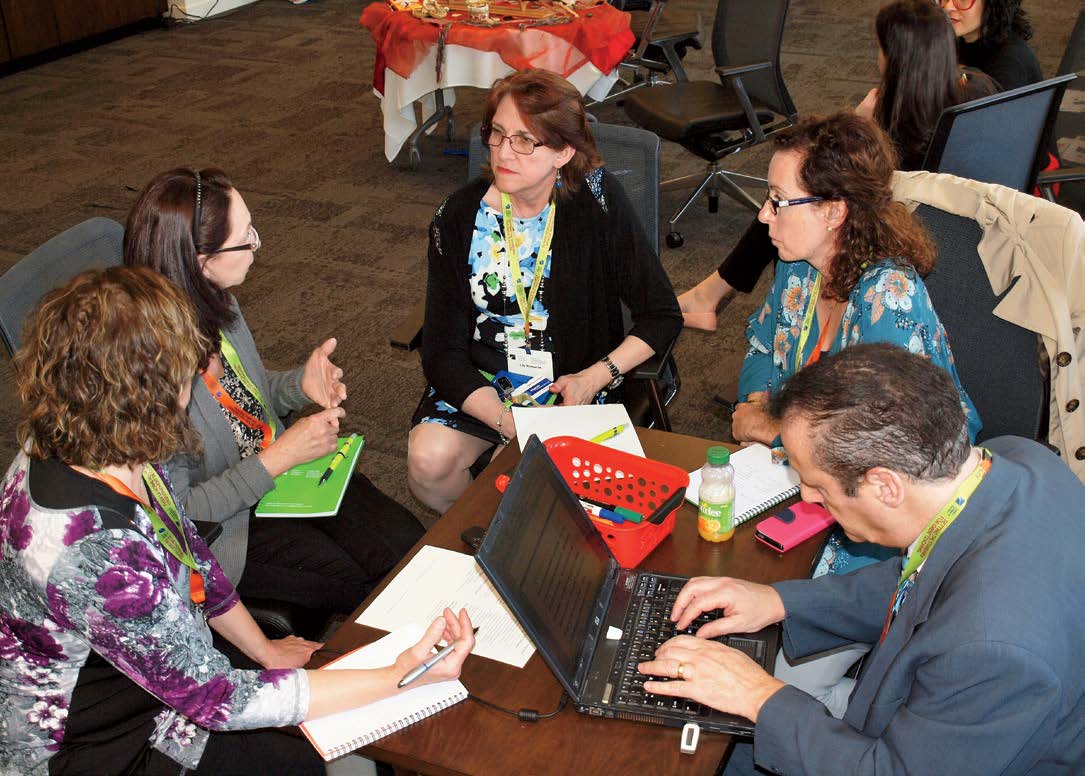Share this page
By Melissa Campeau
Photos : Ontario College of Teachers

To help establish or review guidelines for AQ courses, the College facilitates focus groups, open space consultations, online surveys and more to ensure a diverse group of stakeholders have a chance to share ideas, ask questions, raise concerns and voice perspectives.
Last spring, the College hosted an open space consultation to review the guidelines for the AQ Teaching Students Who Are Deaf or Hard of Hearing — ASL/LSQ, and Teaching Students Who Are Deaf or Hard of Hearing — Aural/Oral Communication.
Cheryl Zinszer, OCT, implementation co-ordinator, LD Pilot Projects, with the Ontario Ministry of Education, was part of the consultation, along with educators, educational partners, members of the deaf and hard-of-hearing community, students and the public. “It was a wonderful experience listening to everyone share their thoughts and experiences,” says Zinszer, who is a qualified teacher of the deaf, and who has held past posts as principal at Robarts School for the Deaf and superintendent for the Provincial Schools for the Deaf and demonstration schools in Ontario.
Close to 75 people attended the event — facilitated in four languages: English, French, American Sign Language (ASL) and Langue des signes Québécoise (LSQ) — to determine recommendations for enhancing the Additional Qualification courses.
Heather Gibson, former assistant to the Superintendents, Provincial and Demonstration Schools Branch, Ministry of Education (and now education officer with the Ministry of Education, Student Achievement Division), was involved in the consultation process to review the guidelines and co-authored a policy document for the American Sign Language (ASL) three-part Specialist qualifications. “The process was enlightening as I started to see how our differences brought us to a place where collectively we were more effective in meeting the challenge together than we would have been apart,” says Gibson. “For example, the technologies we used were innovative, which allowed people like me to bridge language differences between French, English, ASL and LSQ in this project.” She notes this allowed the group to work collaboratively, contributing a wide variety of perspectives.
Theara Yim, OCT, a deaf teacher who speaks LSQ, attended the open space event where participants were asked to work as a team to identify the needs of the community and how the AQ program could better meet those needs. Afterwards, several small-group meetings were scheduled to draft the program, he explains. “The discussions were fair and balanced.”
Feedback was gathered in other ways, as well: 10 teachers for the deaf across the province facilitated focus groups with parents and educators, exploring the knowledge and skills required for teachers of the deaf and hard of hearing.
It’s important to include students in the policy development process since they have first-hand knowledge of what works in schools and what needs to be changed.
The College is considering a proposal by Pierre Beaudin to make the AQ for Teaching Students with Autism Spectrum Disorders a three-part specialization course. While the College consults on this idea, it’s also undertaking a review of the current guidelines.
“There’s a growing number of children who have been identified as being on the autism spectrum, but the professional education hasn’t kept up with this pace,” explains Beaudin. “Teaching students with autism spectrum disorder is very complex; there are a lot of things to learn and they have to be learned correctly. If not, they can really have a detrimental effect.”
The College asked teachers who support students with autism to hold focus groups with students and teachers to gather feedback about the AQ program and how it might better meet students’ needs. It also asked each school district in the province to do the same.
“Through that process you are not only hearing from educators, you will also hear from other professionals supporting students with autism,” explains Déirdre Smith, OCT, manager of the Standards of Practice and Education Unit at the College.
“When you think about students who are deafblind or who are on the autism spectrum, they are among some of the learners with highly complex learning profiles,” explains Smith. “In terms of the Special Education AQ, every teacher is going to have a diversity of learners within their classroom, so that specialized knowledge and skill that comes with the AQ for Special Education is really important to students, families and serves the public interest.”
In addition to focus groups and an online survey about revisions to this AQ’s guidelines, the College held an open space consultation that drew close to 100 participants. The varied group included teachers, principals, superintendents and members of the public. A number of organizations brought students, too, ranging in age from 16 to 21.
Smith believes it’s important to include students in the policy development process since they have first-hand knowledge of what works in schools and what needs to be changed. “When students speak, people listen, and they listen with a compassionate heart. What they hear can transform perspectives, change assumptions and beliefs, and gently challenge people to change policies and practices,” she says.